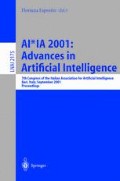Abstract
The main aim of this paper is to present a language for the description of systems of reactive agents situated in an environment.Th is language for Multi—Agent Situated Systems (MASS) has been inspired by a previously introduced Reaction—Diffusion Machine (RDM).I t will be shown that it can describe heterogeneous systems of reactive agents, that is agents with different capabilities through an action model based on reaction—diffusion metaphor.M oreover we show how the model has been applied to the location of suitable sites for extra—urban shopping centres.
Access this chapter
Tax calculation will be finalised at checkout
Purchases are for personal use only
Preview
Unable to display preview. Download preview PDF.
References
Bandini, S. and Simone, C. Integrating Forms of Interaction in a Distributed Coordination Model Foundamentae Informaticae in press.
Bandini, S., De Paoli F., Manzoni, S. and Simone, C. OO Reactive Agents for RDM-Based Simulations Proceedings of the Workshop “Dagli oggetti agli agenti: tendenze evolutive dei sistemi software” Parma, 29–30 maggio 2000.
Connah, D. The Design of Interacting Agents for Use in Interfaces Brouwer-Janse, D. & Harringdon, T.L. (eds.), Human-Machine Communication for Educational Systems Design, Computer and Systems Sciences, 129, Heidelberg: Springer Verlag, 1994.
Ferber, J. Multi-Agents Systems: An Introduction to Distributed Artificial Intelligence Addison-Wesley, Harlow (UK), 1999.
Gentili, G. Principi di concezione e progettazione dei centri commerciali I Centri Commerciali al Dettaglio, 1981.
Engelen, G., White, R., Uljii, I. and Drazan., P. Using cellular automata for integrated modelling of socio-environmental systems Environmental Monitoring and Assessment, 34:203–214, 1995.
Couclelis, H. From Cellular Automata to Urban Models, New Principles for Model Development and Implementation, in Batty, M., Couclelis, H. and M. Eichen Urban systems as Cellular Automata, Special issue of Environment and Planning: Planning and Design, vol.24 n.2, Pion, London, 1997.
Bandini, S., Manzoni, S., Pavesi, G. and Simone, C. Location of Extra-Urban Shopping Centres: A Multi-Agent based Approach Proceedings of INPUT 2001: Informatica e pianificazione urbana e territoriale Isole Tremiti, June, 2001.
Editor information
Editors and Affiliations
Rights and permissions
Copyright information
© 2001 Springer-Verlag Berlin Heidelberg
About this paper
Cite this paper
Bandini, S., Manzoni, S., Pavesi, G., Simone, C. (2001). L*MASS: A Language for Situated Multi-agent Systems. In: Esposito, F. (eds) AI*IA 2001: Advances in Artificial Intelligence. AI*IA 2001. Lecture Notes in Computer Science(), vol 2175. Springer, Berlin, Heidelberg. https://doi.org/10.1007/3-540-45411-X_25
Download citation
DOI: https://doi.org/10.1007/3-540-45411-X_25
Published:
Publisher Name: Springer, Berlin, Heidelberg
Print ISBN: 978-3-540-42601-1
Online ISBN: 978-3-540-45411-3
eBook Packages: Springer Book Archive

